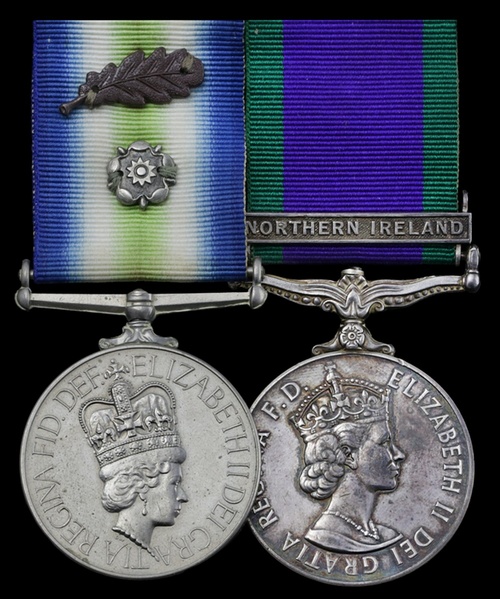
Auction: 20001 - Orders, Decorations and Medals - conducted behind closed doors
Lot: 1065A
The outstanding Falklands 'Sinking of H.M.S. Coventry' campaign pair to Marine P. K. 'Tug' Wilson, Royal Marines, who was mentioned in dispatches for gallantly rescuing thirty crewmen off Falkland Sound on 25 May 1882
South Atlantic 1982, with rosette and M.I.D. oak leaf (Mne 1 P K Wilson P040423E RM); General Service 1962-2007, 1 clasp, Northern Ireland (Mne P K Wilson P040423E RM), very fine (2)
P. K. 'Tug' Wilson was one of ten men of the Royal Marines assigned to H.M.S. Broadsword for the Falklands War. A Type 22 frigate, she was equipped with the Sea Wolf anti-aircraft system, ideally suited to shooting down enemy jets at short range. On 25 May 1982 she supported H.M.S. Coventry, a Type 42 destroyer, during a decoy operation in Falkland Sound designed to draw Argentine attention away from the British landings at San Carlos Bay. Both ships came under attack by A-4 Skyhawks firing Exocet missiles. Two Skyhawks were shot down, but a technical fault in Broadsword's Sea Wolf system meant that two Argentine jets got through. Two Exocet missiles struck Coventry amidships, causing severe damage and engulfing her in flames. As Coventry listed over to port, her crewmen launched two emergency rafts and jumped abord them, abandoning ship. Her Captain, David Hart Dyke, recalled that his men's morale never faltered: in the midst of freezing Atlantic waters they broke into Monty Python's 'Always Look on the Bright Side of Life'.
Salvation came in the form of Broadsword's gemini landing craft, which rushed to the scene. 'Tug' Wilson was a qualified gemini pilot, and he brought his gemini alongside the most vulnerable of Coventry's life rafts. Coventry was on her side and threatening to crush the rafts; it looked as if she might explode at any moment. Wilson and his bowman, Able Seaman Andy Coppell, set to work picking up survivors. Twelve men clambered into Wilson's gemini (which was only made for seven). Wilson distributed paddles among the men who remained on the raft, so they could prevent it floating back towards the sinking Coventry. He returned to Broadsword and dropped of the survivors, before rushing to the second of Coventry's rafts. This time, sixteen men (including Captain Hart Dyke) clambered aboard the gemini, while ten men clung to the sides. Wilson tried to tow the whole raft to safety with a nylon cord. The pressure on the gemini's engines was now so great that it only began moving when the downdraft from a helicopter propelled it forwards. The nylon cable snapped, and Wilson knew that repairing it would endanger those aboard the gemini. He had to carry on without the raft. Luckily, the men clinging to his gemini's sides were airlifted to safety by helicopters. It took 45 minutes to cover the 1,000 yards to reach Broadsword, and his gemini contained eight inches of water by the time he reached her. Overall, Broadsword rescued 170 of Coventry's crew, despite being herself attacked by Argentine planes.
For his remarkable life-saving exploits, Wilson received a mention in dispatches (London Gazette, 8 October 1982), which was announced in The Times on 11 October 1982. His story was told to the Royal Marines Association by Able Seaman Andy Coppell; sold with copied research, testimonies and London Gazette entries.
Recommended reading:
Hart Dyke, Captain D., Four Weeks in May: The Loss of HMS Coventry (London, 2007).
Subject to 20% VAT on Buyer’s Premium. For more information please view Terms and Conditions for Buyers.
Sold for
£4,000
Starting price
£2800




